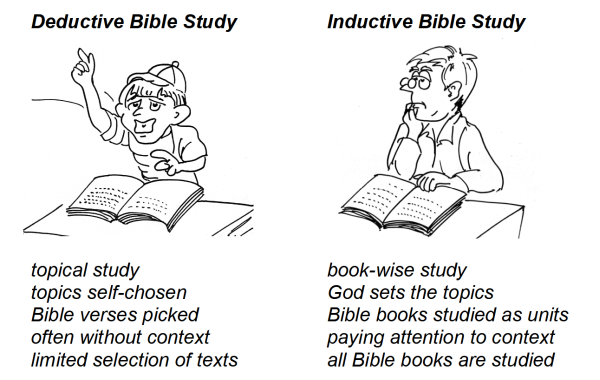Why Inductive Bible Study
Much of today’s preaching and teaching in church and similar settings as well as theological education in general is using a topical Bible study approach (Deductive Bible Study).
In this approach I typically first select a topic (for example: “What is salvation?” “How can I pray more effectively?”, “importance of forgiveness”). Then I look for verses in the Bible addressing the topic I have chosen, usually taking a few verses from here and there. I put the verses together and combine things into a preaching.
Even though in this way I will gain valuable insights about the topic chosen, this approach has some serious flaws:
- One flaw is that it is me doing the choosing of the topic, and that happens typically on the basis of what I already know, of what I heard preached about often or what I was trained in. Yet there may well be a vast array of important topics that God speaks about in the Bible, but since I have not yet learned to see their importance, I never chose these topics nor study them. So they totally elude me.
- Another flaw is that by choosing a few verses from here or there I am not really understanding the context of these verses. I lose very important connections, insights and helps to understand these verses properly. In the best case scenario I just sorely miss out, in the worst case scenario it skews my understanding of the Word seriously, making me vulnerable to very unbalanced interpretations or downright deception.
An illustration: If you were asked whether you know John 3:16, you likely could recite the verse correctly. But if challenged, you likely couldn’t recite John 3:17 or John 3:15. If asked who spoke those famous words, many would indicate Jesus, though they will not be sure. If asked with whom Jesus spoke at that time, even fewer can answer. If Jesus said this verse, and equally the one before and after, then on what basis are we selecting and rejecting verses? Though John 3:16 is, of course, a wonderful verse.
Inductive Bible study
How can I avoid these pitfalls? The answer is: by not choosing topics or verses at will but rather by taking the Bible as a whole, and taking the Bible’s 66 books as whole units (Inductive Bible Study). The Bible is – after all – God’s selection of what he thinks is the essential truth humans need. So it is neither wise nor balanced to leave entire sections of Scripture away, which we commonly do. As much as 80% of the Bible is just about never read and even less preached about.
The principle of Inductive Study also applies to the 66 Bible books as units in themselves. Each of the 66 Bible books are written by a real human author under the inspiration of the Holy Spirit, addressing real people’s real needs. Only if we read entire Bible books, only if we read the verses in their context, going back in time to understand the situation and historical background of the author and his readers, will we understand what is said more fully. Therefore to cut up the text, to take only a few verses here and there, means to seriously lose out on depth of understanding.

This website
To help the reader in his or her own Bible study this website therefore gives helps to understanding the historical context of each book of the Bible. You can find them under the orange heading “Old & New Testament” on this website. You will find all books of the New and the Old Testament displayed. For each book 4 levels of detail are given to suit your need:
- 3 Second Summary expresses the main message of the book in one or two sentences.
- 3 Minute Summary gives you some idea about the author, the readers, the historical situation and the main themes of the book.
- 30 Minute Summary gives detailed information of each about the author, the readers, the historical situation and the main themes of the book.
- Detailed Study gives extensive study materials pertaining to the book.
Some information on the author, the first readers and their historical background will be given. Some major themes and their connection to the historical context for each of the 66 Bible books will also be presented.
Learning Inductive Bible Study step by step
Find below a practical course on how to study the Bible inductively. Start with the smallest Bible book (Philemon), then work your way up to studying bigger books. We will slowly be adding further books and also Old Testament books.